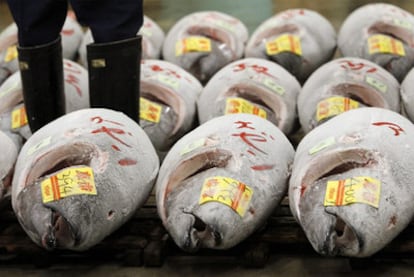Bluefin tuna farms: a sustainable solution for high-grade sushi?
Exporter Balfegó to offer diving tours of its vast offshore fish pens
Spain's leading exporter of bluefin tuna has come up with a new way of promoting its sustainable approach to farming this endangered species.
From next May, Balfegó, based in the Catalan Mediterranean port of L'Ametlla de Mar, will be organizing diving trips to the vast circular pens it has anchored 16 kilometers out to sea, which contain up to 8,000 prime specimens of bluefin tuna.
Divers interested in swimming with tuna will be able to take a trip out to sea and watch a Balfegó diver cull fish weighing up to 300 kilograms with a spear gun. The tuna, which will have been fed tons of fish over several months to bring them up to size, are then hauled aboard, headed, and gutted within minutes and laid in ice to preserve their valuable meat.
Like 90 per cent of the Mediterranean catch, these fish - which can be valued at more than $10,000 each - will end up in Japanese restaurants as high-grade sushi.
"We think that around 7,000 people a month will want to take a dive to see tuna being culled," says Pere Vicent Balfegó, president of the group. Last year, the company turned over 28 million euros, and expects to report a similar amount this year.
Balfegó is allowed to catch 1,000 tons of bluefin tuna a year. The World Wide Fund for Nature estimates that 60,000 tons are fished from the Mediterranean a year - more than twice the legal limit. It's a very, very profitable business.
Illegal fishing
But environmentalist groups such as Ecologistas en Acción say the bluefin is close to extinction and that, rather than breeding the fish in underwater ranches for it to be sold for sushi in Japan, more should be done to allow it to survive in its natural environment. "More than 500,000 tons have been illegally fished in the last 15 years," says an Ecologistas en Acción spokesman.
Balfegó says all its fish are bar-coded and traceable and that it is making every effort to sustain the fishery, even embarking on an experimental spawning program.
Juan Serrano, Balfegó's managing director, disagrees. He vehemently disputes the idea that the bluefin tuna is, in his waters at least, a threatened species. "What we are doing is not only entirely legal, it is sustainable. There is ample scientific evidence from independent sources that confirms our belief that bluefin tuna populations in the western Mediterranean are actually increasing."
Environmentalists argue that the average size of the individual tuna that is caught for Balfegó's ranch is going down steadily year on year - a sign, allegedly, of a dangerous plundering of the stock.
This, again, is disputed by Serrano: he points out that the extraction of tuna from the Spanish Mediterranean is not a free-for-all. "The entire national quota of tuna is caught by six boats in the single month per year they are allowed to operate."
Balfegó owns four of those six licensed bluefin tuna fishing vessels in Spain.
"Within this industry," says Serrano, "there are good and bad operators."
"No doubt there are some that operate on the wrong side of the rules."
In 2010, the European Union fixed the annual limit on bluefin at 13,500 tons, since which, Balfegó's vessels have been kept under strict surveillance during the short fishing season. "Sustainability is vital to us, as is transparency in what we do," says Serrano.

Tu suscripción se está usando en otro dispositivo
¿Quieres añadir otro usuario a tu suscripción?
Si continúas leyendo en este dispositivo, no se podrá leer en el otro.
FlechaTu suscripción se está usando en otro dispositivo y solo puedes acceder a EL PAÍS desde un dispositivo a la vez.
Si quieres compartir tu cuenta, cambia tu suscripción a la modalidad Premium, así podrás añadir otro usuario. Cada uno accederá con su propia cuenta de email, lo que os permitirá personalizar vuestra experiencia en EL PAÍS.
¿Tienes una suscripción de empresa? Accede aquí para contratar más cuentas.
En el caso de no saber quién está usando tu cuenta, te recomendamos cambiar tu contraseña aquí.
Si decides continuar compartiendo tu cuenta, este mensaje se mostrará en tu dispositivo y en el de la otra persona que está usando tu cuenta de forma indefinida, afectando a tu experiencia de lectura. Puedes consultar aquí los términos y condiciones de la suscripción digital.








































